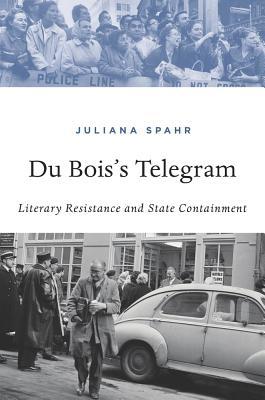
In 1956 W. E. B. Du Bois was denied a passport to attend the Présence Africaine Congress of Black Writers and Artists in Paris. So he sent the assembled a telegram. “Any Negro-American who travels abroad today must either not discuss race conditions in the United States or say the sort of thing which our State Department wishes the world to believe.” Taking seriously Du Bois’s allegation, Juliana Spahr breathes new life into age-old questions as she explores how state interests have shaped U.S. literature. What is the relationship between literature and politics? Can writing be revolutionary? Can art be autonomous, or is escape from nations and nationalisms impossible? Du Bois’s Telegram brings together a wide range of institutional forces implicated in literary production, paying special attention to three eras of writing that sought to defy political orthodoxies by contesting linguistic avant-garde modernism of the early twentieth century; social-movement writing of the 1960s and 1970s; and, in the twenty-first century, the profusion of English-language works incorporating languages other than English. Spahr shows how these literatures attempted to assert their autonomy, only to be shut down by FBI harassment or coopted by CIA and State Department propagandists. Liberal state allies such as the Ford and Rockefeller foundations made writers complicit by funding multiculturalist works that celebrated diversity and assimilation while starving radical anti-imperial, anti-racist, anti-capitalist efforts. Spahr does not deny the exhilarations of politically engaged art. But her study affirms a sobering aesthetic resistance is easily domesticated.
Author

Juliana Spahr (born 1969) is an American poet, critic, and editor. She is the recipient of the 2009 Hardison Poetry Prize awarded by the Folger Shakespeare Library to honor a U.S. poet whose art and teaching demonstrate great imagination and daring. Both Spahr's critical and scholarly studies, i.e., Everybody’s Autonomy: Connective Reading and Collective Identity (2001), and her poetry have shown Spahr's commitment to fostering a "value of reading" as a communal, democratic, open process. Her work therefore "distinguishes itself because she writes poems for which her critical work calls." In addition to teaching and writing poetry, Spahr is also an active editor. Spahr received the National Poetry Series Award for her first collection of poetry, Response (1996). (from Wikipedia)